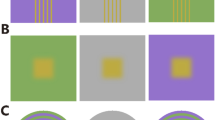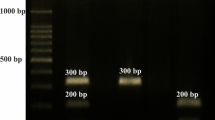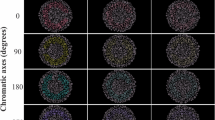Abstract
EDRIDGE-GREEN1 has directed attention to the shortening of the violet end of the spectrum which he found in some persons. A test of sensitivity to red, orange, yellow, yellow-green, green, blue-green, blue, violet and purple was carried out on 103 men and 104 women, excluding all red-green blind and red or green anomalous subjects. The experiment was performed with a form of colorimeter using the Ilford Monochromatic filters (601–8) and purple (501). Relative brightness was measured as well as sensitivity to hue.
This is a preview of subscription content, access via your institution
Access options
Subscribe to this journal
Receive 51 print issues and online access
$199.00 per year
only $3.90 per issue
Buy this article
- Purchase on Springer Link
- Instant access to full article PDF
Prices may be subject to local taxes which are calculated during checkout
Similar content being viewed by others
References
Edridge-Green, F. W., "Colour-Blindness and Colour-Perception", chap. 12 (1891).
Walls, G. L., "The Vertebrate Eye", 99 (1942).
Author information
Authors and Affiliations
Rights and permissions
About this article
Cite this article
PICKFORD, R. Darkened Violet in Colour Vision. Nature 156, 506–507 (1945). https://doi.org/10.1038/156506c0
Issue Date:
DOI: https://doi.org/10.1038/156506c0
Comments
By submitting a comment you agree to abide by our Terms and Community Guidelines. If you find something abusive or that does not comply with our terms or guidelines please flag it as inappropriate.



